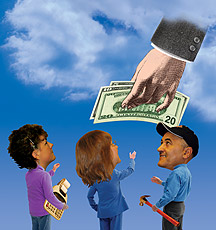Laypeople who make a living in the church love what they do–but don't always love the pay.
Since the beginning Christian leaders have taken these words of Jesus quite literally: "Rejoice and be glad for your reward will be great in heaven" (Matt. 5:12). If you worked for the church, you were expected to defray the greater part of your earnings indefinitely, cashing in, so to speak, only after crossing through the pearly gates. That worked relatively well for many years, thanks to the abundant supply of sisters, priests, and brothers who chose lives of poverty while tilling the fields of the Lord. But with the ever-diminishing supply of such laborers during the past 35 years, we have moved into the age of the laity-a fascinating, hitherto unexplored era for Catholicism.
One indicator of change is that since 1997 there are more paid, professional lay ministers than priests working in U.S. parishes, and the gap continues to grow. Another is that in 1990, 41 percent of parish ministers were women religious; today they comprise 17 percent, and that percentage also continues to decline. Bishops and other church leaders realize the trend is not going to reverse itself; some 18,000 Catholics currently are training for lay ministry in the U.S., almost six times the number of seminarians.
In Co-workers in the Vineyard of the Lord, the U.S. Catholic bishops said last November, "Lay ecclesial ministry has emerged and taken shape in our country through the working of the Holy Spirit. Sharing in the function of Christ, priest, prophet, and king, the laity have an active part of their own in the life and activity of the church." Obviously the laity have advanced beyond their old "pray, pay, and obey" status, and the lay ministry field has become powerfully attractive to many Catholics
Less is more
Joan Kelly, for example, took a 60 percent pay cut when she quit her job as vice president at a major Chicago bank two years ago. She exchanged her 20-year corporate lifestyle, a hefty salary, and many perks for a position as secretary and office manager for a 1,500-family suburban parish. "Partly I was burnt out," she says, "and I saw this as something different, maybe where I'd get some sense of social reward.
"Now I'm at the bottom," laughs Kelly, a cheerful, energetic 46-year-old workhorse in the rectory. "I'm sealing envelopes, entering contributions in the books, upgrading the phone and computer system. I still can't believe I have to order supplies. I used to leave a note on somebody's desk at the bank and they'd just take care of it."
She lists some other changes: no cleaning lady; a very different and limited clothing budget; a major cutback on restaurant dinners and entertainment; heavy reliance on the salary of her husband, a painter; and having to say no more often to her three teenage daughters. And the advantages?
"There are spiritual rewards when you don't measure all your decisions in dollars," she says. "There are a lot of sacred moments here," when strangers come to the door needing help, when parishioners drop in to discuss important things. "I see now how incredibly privileged we are," Kelly explains. "I didn't get it before."
Her daughters, who at first objected to the budget limitations, are starting to get it, too. "One said to me just lately, ‘Mom, I can see why you left the bank.'?" It's little things like this that make her think the pay cut was worthwhile.
But the Kelly family's willingness to take a large cut in income makes them a bit unusual among lay church workers today. A major issue for the 21st-century church is compensation for these co-workers in the vineyard. Most laypersons don't have the luxury of defraying earnings to the next life. Single or married, they require and deserve salary and benefits equal to that earned by their peers in other professions.
When looking at the state of compensation today for laypeople working in parishes, most of the available information is on "lay ministers," those trained in church-related specialties like theology or liturgy and employed on parish pastoral staffs. Limited information also exists on "lay employees," which includes maintenance personnel, business managers, secretaries, and others serving parishes.
In addition, laypeople work in many other Catholic settings-in parochial schools and universities, in hospitals and Catholic Charities centers, in cemeteries and diocesan offices. But their pay and benefits are so varied that accurate comparative analysis is impossible. Besides, the parish remains the basic building block of the church, and it's where the vast majority of the new lay workers can be found.
Two recent studies examined the state of compensation today, one by the National Association of Church Personnel Administrators, published last August, the other by the National Pastoral Life Center, released in November. The Pastoral Life study was based on information from 928 U.S. parishes and individual responses from 732 lay ministers and 336 pastors. It was commissioned by the Committee on the Laity of the U.S. bishops' conference, funded by the Lilly Foundation, and directed by David DeLambo, associate director of pastoral planning for the Cleveland diocese. This is the third national study of lay ministry that DeLambo, a sociologist, has overseen.
He found that there are now 30,632 paid lay ministers working at least 20 hours a week in parishes, a 5 percent increase over 1997 and a 35 percent increase between 1990 and 1997. By "lay," the study understands both laypersons and vowed religious working in paid positions as members of pastoral staffs. Not included in the study are business managers, maintenance personnel, and other support staff.
The average salary of full-time ministers in the six categories studied was $35,261. Current salaries represent striking increases since 1990 (see graph below). The greatest relative increase is 189 percent in the "other ministers" category (a catch-all for positions like family minister, social concerns minister, minister to the bereaved). The general ministry category, which includes pastoral associates and pastoral administrators, has a salary average of $34,048, showing a 125 percent increase over 1990. The largest average salary, $42,778 for music ministers, represents a 145 percent increase over the 1990 figure.
Singing for his supper
At 59, Christopher Walker has the kind of job many of his colleagues in the church dream about. He is the music director at a large Los Angeles parish, where he earns a yearly salary typical of those who, like him, have been at their present post for 15 years-usually in the area of $45,000$50,000. It's a demanding job, he says, swallowing up his weekends, often filling his week with funeral liturgies and stretching his schedule to 50 or 60 hours a week in busy holiday seasons.
"But that's alright," says Walker, who is single. "I don't see this as work. I feel a real sense of ministry. I see lives changed, not just by a piece of music, but by the way it's played."
Can he make a living on his parish earnings in high-priced L.A.? "Just barely," says Walker.
Fortunately he is also an internationally known lecturer, composer, conductor, and retreat master for church musicians. So his income is happily supplemented by stipends for his talks and workshops and royalties on his published music, the best known being the popular "Celtic Alleluia." Fortunately, too, he has a pastor and parish who give him the freedom to share his wisdom and musical skills widely.
However, the gains in lay ministers' salaries in the past 15 years are not quite as breathtaking as they appear, since inflation and the cost of living have lessened the value of the dollar. Even so, the gain is still an additional 8 percent, or about $4,000 more than in 1997 dollars.
A just wage?
Are these figures comparable to what workers in the national population make? DeLambo says they are. He compared median salary figures for lay ministers with median salary figures for all U.S. workers (from the U.S. Census Bureau's Population Survey for 2003). As it turned out, full-time women ministers (excluding religious women) have a median income of $32,500, compared to $30,203 for women overall. Meanwhile, full-time male ministers have a median of $37,500, compared to $39,429 for men overall.
Of course, the numbers for U.S. workers "overall" do not take into account the level of education attained. Most lay ministers have at least a bachelor's degree. The same U.S. Census survey reveals that women with a bachelor's degree earn a median $35,109, and men with a bachelor's degree earn a median $51,507, considerably more than the respective medians for lay ministers.
The Pastoral Life study indicates that lay parish ministers average household incomes of $57,500, which is 27 percent higher than the $42,409 average for household incomes in the general population, but again does not account for education levels.
Still, this is an improvement on past figures. According to Carol Fowler, director of personnel services for the Chicago archdiocese, the improved state of compensation is directly related to the increased number of dioceses hiring professional human resources specialists. "As soon as an HR person gets in and takes a look at salaries and benefits, things begin to get better," she says.
But Catholics appear to be doing poorly compared to their Protestant peers in similar church work. According to the National Association of Church Business Administration (NACBA), the median salary for Protestant, non-ordained general pastoral ministers is $48,100, a whopping $15,000 more than the average for Catholic general pastoral ministers; the median salary for non-ordained Protestant music ministers is $53,700, or $11,000 more than the average for their Catholic peers. Median salary for non-ordained youth ministers is about $3,000 more than the Catholic average.
However, the apparent disparity is diminished somewhat when one notes that the NACBA figures include in many cases salary and housing for these ministers.
Still lurking in the midst of all the data is the question of whether Catholic ministers are satisfied with their earnings. Asked if they agreed that compensation was sufficient for their personal, family, and church needs, 22.5 percent of the respondents strongly agreed and 47.5 agreed somewhat. But 32 percent said compensation was not sufficient. DeLambo admitted that last figure suggests there's a large contingent (almost a third) of frustrated, unhappy ministers out there. But he says in many places these lay ministers accept less than a satisfying return because they know the parishes can't afford to provide a satisfactory wage.
Also, a considerable disparity exists between the salaries of men and women in parish ministry. And it remains to be seen whether the young, idealistic lay ministers who have entered the field in recent years will be able to stay as their financial needs increase.
Making it work
Christoph Nauer and his wife, Kate, say they are fully committed to lay ministry and will stay in the work as long as they can afford to. He is the pastoral associate at a 1,000-family, upper-middle-class parish near Oakland, California. She is the youth minister and director of the teen Confirmation program at the same parish.
Born in Switzerland and with a degree in business, Christoph moved to the U.S. and studied theology at the Franciscan School of Theology near Berkeley, where he met Kate. "Business isn't what I want to do," says Christoph, 45. "I'm much more interested in faith and the role it plays in peoples' lives."
At the parish he works in adult education, social justice, liturgy, Baptism and Confirmation preparation, though the RCIA program gives him the greatest sense of fulfillment. "It's wonderful to journey with these folks and see their faith develop," he says.
Kate, 47, had planned to attend law school but changed her mind when she was offered a position as youth minister, which she's been doing for 10 years. "I love teens," she says. "That's where the future of the church is."
Christoph and Kate have three children, 10, 12, and 14. Together, the couple make about $65,000 a year and have reasonably good health and pension benefits. But the cost of living in the Bay Area is high, so their lifestyle is accordingly pretty simple.
"I was never inspired by wealth," says Kate, "and we like raising the kids contrary to ordinary expectations."
"It's fine for now," adds Christoph, "but when college tuition bills arrive we'll have to get creative."
Not-so-golden years
The real level of benefits may be the Achilles heel for church workers in many dioceses, says Marion Bau, 70, who spent 47 years in various church positions and doesn't regret any of it. "It was where God wanted me to be," she says. But she admits serving the church was a struggle. "Almost always I had two jobs," says Bau, now retired. "That was the only way to make it work."
After 14 years as a Catholic school teacher, she spent 16 years as a director of Religious Education at a parish in Potomac, Maryland (starting salary: $8,500), then taught Latin for several years at The Catholic University in Washington, D.C., took a hiatus to teach in public schools, then finished with 11 years as adult education supervisor and later as director of a Catholic Charities crisis center in the Wilmington, Delaware diocese.
Bau says the big deficiency in lay Catholic ministry is poor retirement benefits. "When I was working for the church, I had health insurance," she says. "When I retired two years ago that was the end. I was left high and dry."
Fortunately her 13 years in the public system proved a lifesaver. She was able, as a retiree, to plug into the public system's health insurance and also receive a generous pension. That pension, she says, is larger than the pensions she receives from the Washington and Wilmington dioceses put together, though those are the places where she spent the bulk of her career. "So I thank God I'm not homeless," says Bau.
Job satisfaction
Despite concerns about compensation sufficiency, the Pastoral Life Center reported that lay ministers were almost universally positive about their work. Upwards of 94 percent described their experience as "meaningful," "satisfying," "giving a sense of accomplishment," and "challenging." More than 60 percent cited support for their own spiritual life and interaction with parishioners as "the most satisfying aspects" of their work.
On the other hand, when requested to name aspects of parish ministry "most needing improvement," the top choice of respondents was "salary," almost double that of the next most troubling issue, "interactions with the clergy."
This suggests there's rumbling in many rectories. Almost 36 percent of the ministers said they had either "often" or "sometimes" considered leaving their jobs during the past year. Among the reasons mentioned (in no specific order) were retirement, burnout, conflict with pastors or others in the parish, and inadequate compensation and benefits.
Rarely do these concerns become national news stories. But a dispute still simmering in the Brownsville, Texas diocese became public after four lay ministers at Holy Spirit Church in McAllen were summarily fired in 2003. "You're really vulnerable in this work," says Ann Cass, pastoral associate at Holy Spirit and a parish employee for 23 years. "A pastor makes a decision one day and you're out on your butt."
The problem began in 2000 when Bishop Raymundo Pena terminated the pension plan for employees and substituted a new, "contribution defined" plan. In effect, says Cass, the new arrangement deprives veteran church employees like herself of one third or more of their pension benefits on retirement. Employees at four parishes and their pastors signed contracts, joining the United Farm Workers union. The agreement, believed to be the first unionization of parish workers in the country, provides a union pension plan and a mandatory grievance procedure, and it seemed to work well for a time.
But when a new pastor arrived at Holy Spirit, he quickly fired Cass and three others, reportedly in retaliation for joining the union. "The church should model its own teachings on social justice," Cass told reporters, "and it's doing just the opposite."
So heated was the fallout that the pastor was eventually replaced by a new priest who rehired Cass and the others. But the issue of unionization remained unsettled. Bishop Pena then appointed a three-member "tribunal" of canon lawyers to judge the legality of the union contract. Last November their decision was announced: The agreement at Holy Spirit was ruled invalid on the grounds that pastors lack the authority to enter into union contracts. The situation at the other unionized parishes is unclear.
Cass says the issue will not go away. "We're ready to go all the way to the Supreme Court if necessary," she says. "And we'll take our case to Rome, too."
In for the long haul
Cass' determination to remain, despite frustration, is mirrored in the 95 percent in the Pastoral Center study who say they envision working in the church either "indefinitely" or "for the next few years." The majority said they entered ministry because they felt a "call from God." None of the other reasons-such as "an invitation by the pastor" or "the variety of experience" offered by the job-came anywhere near this sense of vocation. No one gave salary or benefits as a reason for entering ministry.
As co-coordinator of the Women in Church Leadership Project, St. Joseph Sister Christine Schenk has been in contact with hundreds of pastoral administrators and other church professionals during the past 10 years. She concurs that progress in compensation is undeniable but emphasizes the pressing need for improved support from parishes and dioceses in the continuing education needs of lay ministers.
"For seminarians, church support is taken for granted," she says, "but lay ministers still often must pay their own way."
She also has misgivings about a statement in the bishops' otherwise highly supportive Co-workers in the Vineyard document, which said, "It may be desirable in some situations that the term of a lay ecclesiastical minister conclude, even if subject to renewal, when the pastor's term of office comes to an end. The potential for tension is present in every transition."
It's a "troubling message that could lead to abuse," says Schenk, since it implies that the first priority in a parish transition is the needs of the new pastor, whereas the first consideration should be "the needs of the parish and the staff that has been serving the parish."
Because of the different methods and definitions in the Pastoral Life and in the NACPA studies, it is impossible to accurately correlate the data for the two. Overall, however, the NACPA salaries appear about 9 to 10 percent higher than salaries in comparable jobs as reported by the Pastoral Life Center. For example, the three NACPA youth minister categories average $34,100, while the Pastoral Life youth minister figure is $31,563.
Among all its job subdivisions, the highest national average salary in the NACPA figures is $57,564 for a "parish director II," a person who runs a parish in the absence of a pastor. The lowest is $26,596 for a Pastoral Care Minister who, among other things, visits the sick, grieving, homebound, and dying. For employees earning an hourly wage, the highest national average is $15.33 for a parish or school executive secretary. The lowest, $9.41, is for an early childhood aide.
Salaries in the Northeast tend to run about 14 percent higher than the national averages; salaries in the West, about 8 percent higher. Those in the Midwest are about even with the national averages, while salaries in the South and in the central area run about 8 percent below the national averages.
As DeLambo of the Pastoral Life study notes, "The church today realizes the importance of lay ministry and is demonstrating in significant ways its commitment through salaries and pay scales, ministry classifications, certification programs, training, and continuing education. For this development to have longevity, it needs to be professionalized and institutionalized. If we want quality people in ministry, we have to make it a desirable career."













Add comment